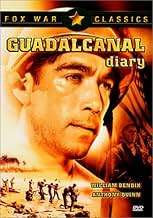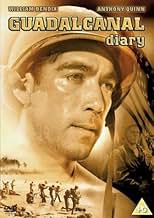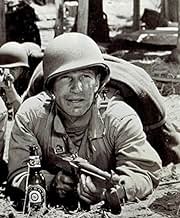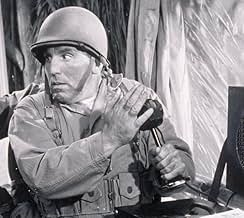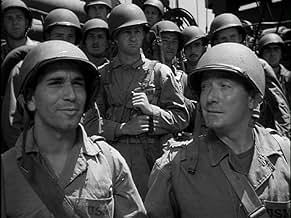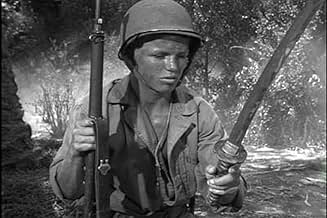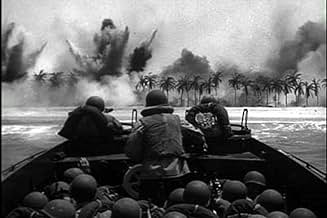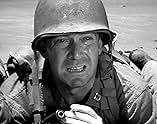IMDb-BEWERTUNG
6,7/10
2369
IHRE BEWERTUNG
Füge eine Handlung in deiner Sprache hinzuThe story of a large U.S. Marines invasion task force bound for Guadalcanal in the Solomon Islands in 1942.The story of a large U.S. Marines invasion task force bound for Guadalcanal in the Solomon Islands in 1942.The story of a large U.S. Marines invasion task force bound for Guadalcanal in the Solomon Islands in 1942.
- Auszeichnungen
- 1 wins total
Eddie Acuff
- Pvt. Tex Mcllvoy
- (Nicht genannt)
Warren Ashe
- Col. Morton
- (Nicht genannt)
Martin Black
- Marine
- (Nicht genannt)
Marion Carl
- Marine Pilot
- (Nicht genannt)
Harry Carter
- Dispatch Officer
- (Nicht genannt)
Tom Dawson
- Captain
- (Nicht genannt)
Empfohlene Bewertungen
Hard hitting war movie about the first land offensive by the US in the Pacific Theater of War. Linking up with a US Navy battle task force in the South Pacific, in late July 1942, a US Marine troop ship gets the word that it's men are to be part of the invasion of the Japanese held Solomon Islands landing at a place called Gudalcanal.
Heading the invasion force is Marine Col.Wallace Grayson, Minor Watson, of the 1st. Marine Div. who's told to expect stiff resistance when his men hit the beach. As D-Day, August 7, 1942, approaches there's an eerie feeling among the Marines on deck that this first land battle is going to be a lot different then any thing that they could possibly imagined, they were right.
Powerhouse cast headed by Marine Chaplin Father Donnelly, Preston Foster, with tough as nails Marine Sgt. Hook Malone, Llyod Noland, and young 17 year old Richard Jackel as the baby-face and non-shaving Pvt. Johnny "Chicken" Anderson storm ashore on Gaudalcanal only to find that the Japanese are nowhere to be found and the "stiff resistance" that they expected was almost non-existent. Caught off guard and by surprise the Japanese defenders took off in the jungles and caves on the island. It's there that they waited to be reinforces by fresh Nippon army and marine units from the neighboring Japanese-held islands of Rabaul and Bouganinvillea.
With the US Marines capturing the Japanese air-field on the island, renaming it Henderson Field, and having much needed supplies flown in everything look up for the leathernecks and the battle of Guadalcanal seems just about over. The truth later turned out to be that the battle only began and would last some eight months. In the end Gaudalcanal would cost the US Marines Army and Navy some 20,000 casualties by the time it was over.
Far more realistic then most of the movies made by Hollywood in WWII about WWII "Guadalcanal Diary" keeps the action up and the the false heroics down. Making the Marines in the movie more human with real emotions and feeling about surviving the battle and coming back home when the war's finally over.
We also see the Japanese as both tough and effective, as well as cunning,soldiers not the wild-eyed and mindless fanatics were used to seeing, in the many war movies released back then. Thus giving the American public a better idea of what the men in both the US Marines and Army were fighting in the war in the Pacific.
The US Marines at first being told by a captured Japanese soldier that his unit is ready to surrender send a patrol to the off-shore island village of Matanikau only to find that the Japanese troops waiting for them. In an ambush the Japanese wiped out the entire Marine patrol, including it's commanding officer Capt. Cross ,Roy Roberts. Cpt. Alvarez, Anthony Quinn, was the only survivor who escapes by swimming out at sea. It now becomes apparent that the Japanese are not giving up that easily and the Maines dig in for the major battles that are soon to come.
In a tough sea air and land campaign the US and Japanese forces slug it out as the Japanese Navy tries to cut off reinforcements to the Marines on the Island. Leaving them isolated and sitting ducks for their massive naval and air attacks. The fighting goes on unabated until the US finally breaks through the Japanese blockade. As new Army as well as Marine unites land on the Island, and on Novermber 11, 1942 launch a major counter-attack that clears Gudalcanal of Japanese troops. The Japanese, unlike in the movie, were successfully evacuated by sea not massacred on the beaches by the Marines and GI's. Still the battle of Gudalcanal was the first of many Japanese held island taken by US forces that eventually lead to the defeat of Japan in the late summer of 1945.
With all the action and heroics in the movie the most moving scene in the film is when the Marines, underground in their bunker, are being hit by a nerve wracking and murderous Japanese naval and air bombardment. The Marines acted like you would expect to act under the same circumstances, scared and afraid. Cpl. Aloysius "Taxi" Potts, William Bendix, put it best when he says "I'm no hero I'm just a guy I've come out her because somebody had to come, I don't want no medals I just want to get this over with and go back home".
Heading the invasion force is Marine Col.Wallace Grayson, Minor Watson, of the 1st. Marine Div. who's told to expect stiff resistance when his men hit the beach. As D-Day, August 7, 1942, approaches there's an eerie feeling among the Marines on deck that this first land battle is going to be a lot different then any thing that they could possibly imagined, they were right.
Powerhouse cast headed by Marine Chaplin Father Donnelly, Preston Foster, with tough as nails Marine Sgt. Hook Malone, Llyod Noland, and young 17 year old Richard Jackel as the baby-face and non-shaving Pvt. Johnny "Chicken" Anderson storm ashore on Gaudalcanal only to find that the Japanese are nowhere to be found and the "stiff resistance" that they expected was almost non-existent. Caught off guard and by surprise the Japanese defenders took off in the jungles and caves on the island. It's there that they waited to be reinforces by fresh Nippon army and marine units from the neighboring Japanese-held islands of Rabaul and Bouganinvillea.
With the US Marines capturing the Japanese air-field on the island, renaming it Henderson Field, and having much needed supplies flown in everything look up for the leathernecks and the battle of Guadalcanal seems just about over. The truth later turned out to be that the battle only began and would last some eight months. In the end Gaudalcanal would cost the US Marines Army and Navy some 20,000 casualties by the time it was over.
Far more realistic then most of the movies made by Hollywood in WWII about WWII "Guadalcanal Diary" keeps the action up and the the false heroics down. Making the Marines in the movie more human with real emotions and feeling about surviving the battle and coming back home when the war's finally over.
We also see the Japanese as both tough and effective, as well as cunning,soldiers not the wild-eyed and mindless fanatics were used to seeing, in the many war movies released back then. Thus giving the American public a better idea of what the men in both the US Marines and Army were fighting in the war in the Pacific.
The US Marines at first being told by a captured Japanese soldier that his unit is ready to surrender send a patrol to the off-shore island village of Matanikau only to find that the Japanese troops waiting for them. In an ambush the Japanese wiped out the entire Marine patrol, including it's commanding officer Capt. Cross ,Roy Roberts. Cpt. Alvarez, Anthony Quinn, was the only survivor who escapes by swimming out at sea. It now becomes apparent that the Japanese are not giving up that easily and the Maines dig in for the major battles that are soon to come.
In a tough sea air and land campaign the US and Japanese forces slug it out as the Japanese Navy tries to cut off reinforcements to the Marines on the Island. Leaving them isolated and sitting ducks for their massive naval and air attacks. The fighting goes on unabated until the US finally breaks through the Japanese blockade. As new Army as well as Marine unites land on the Island, and on Novermber 11, 1942 launch a major counter-attack that clears Gudalcanal of Japanese troops. The Japanese, unlike in the movie, were successfully evacuated by sea not massacred on the beaches by the Marines and GI's. Still the battle of Gudalcanal was the first of many Japanese held island taken by US forces that eventually lead to the defeat of Japan in the late summer of 1945.
With all the action and heroics in the movie the most moving scene in the film is when the Marines, underground in their bunker, are being hit by a nerve wracking and murderous Japanese naval and air bombardment. The Marines acted like you would expect to act under the same circumstances, scared and afraid. Cpl. Aloysius "Taxi" Potts, William Bendix, put it best when he says "I'm no hero I'm just a guy I've come out her because somebody had to come, I don't want no medals I just want to get this over with and go back home".
I can't be offended by the truth, and the truth is, GIs called the enemy in the South Pacific "Japs," "Slant-eyes," and a lot worse. If that offends anyone, then why watch a film that you know is about a bloody WWII battle, where passions were running high? After the Marine shoots the Japanese sniper out of the tree, would it have been less offensive if he would have said, "Well, I just dispatched another one of the Asian enemy." Really! I can just imagine what someone would say in the heat of battle. It'd be a hell of a lot more descriptive than "Slant-eye."
As for the nameless reviewer who criticized the scene wherein the GI did not get mail, I can tell you first hand, that there were fewer sights more pathetic than the guys standing there after mailcall without a single letter in their hand. It was hard to watch. We all felt for those guys. You knew what they were going through, yet you couldn't do a damn thing to help them. I know how I felt when days went by without a letter from home--from ANYONE. Being in combat in a foreign land must have made it exponentially worse. I would bet that the reviewer who made that criticism never spent one day in his country's service.
As for the nameless reviewer who criticized the scene wherein the GI did not get mail, I can tell you first hand, that there were fewer sights more pathetic than the guys standing there after mailcall without a single letter in their hand. It was hard to watch. We all felt for those guys. You knew what they were going through, yet you couldn't do a damn thing to help them. I know how I felt when days went by without a letter from home--from ANYONE. Being in combat in a foreign land must have made it exponentially worse. I would bet that the reviewer who made that criticism never spent one day in his country's service.
War correspondent Richard Tregaskis's memoir of the battle for the strategic island of Guadalcanal provides the basis of this film with a solid cast of players. Tregaskis himself is played unnamed in the film by Reed Hadley, who's rich narrative voice greatly enhances the film.
Guadalcanal Diary unfortunately has not aged well. It was made the year after Guadalcanal, together with its key airfield Henderson Field was finally cleared of Japanese. It was a slow, steady war of attrition, on both land and sea. While this film concerns the Marines on the island, at sea our navy was battling with the Japanese Navy in what was euphemistically called 'the slot' which was a channel that bisected the Solomon chain neatly in half. Our Marines dealt not only with the Japanese on the ground, but from Naval bombardment from the Japanese Fleet whenever they snuck in. The Japanese positions were in the jungle and further in land and were less affected by off shore shelling from us.
All the types you expect from World War II are there, the tough Marine sergeant Lloyd Nolan, the Marine from Brooklyn, where else, William Bendix, the young recruit, Richard Jaeckel in his first film playing a teenager when he actually was one. Preston Foster plays the Catholic chaplain, a wise and compassionate fellow who once played football for Notre Dame. It's a page out of Pat O'Brien's Father Duffy portrayal from The Fighting 69th and Foster is the best one in the film.
Sad to say that the Marines do refer to the Japanese as less than human on a few occasions. It's why the film doesn't age well, especially after Clint Eastwood's latest films about the Pacific Theater.
Guadalcanal Diary still is a good film for those who are fans of World War II films made in the World War II years.
Guadalcanal Diary unfortunately has not aged well. It was made the year after Guadalcanal, together with its key airfield Henderson Field was finally cleared of Japanese. It was a slow, steady war of attrition, on both land and sea. While this film concerns the Marines on the island, at sea our navy was battling with the Japanese Navy in what was euphemistically called 'the slot' which was a channel that bisected the Solomon chain neatly in half. Our Marines dealt not only with the Japanese on the ground, but from Naval bombardment from the Japanese Fleet whenever they snuck in. The Japanese positions were in the jungle and further in land and were less affected by off shore shelling from us.
All the types you expect from World War II are there, the tough Marine sergeant Lloyd Nolan, the Marine from Brooklyn, where else, William Bendix, the young recruit, Richard Jaeckel in his first film playing a teenager when he actually was one. Preston Foster plays the Catholic chaplain, a wise and compassionate fellow who once played football for Notre Dame. It's a page out of Pat O'Brien's Father Duffy portrayal from The Fighting 69th and Foster is the best one in the film.
Sad to say that the Marines do refer to the Japanese as less than human on a few occasions. It's why the film doesn't age well, especially after Clint Eastwood's latest films about the Pacific Theater.
Guadalcanal Diary still is a good film for those who are fans of World War II films made in the World War II years.
I grew up watching World War 2 movies with my Father (WW 2 US Army Combat engineer), so I can say that I know a lot about the genre. This movie is one of the better ones. I rate it a 7 on a 10 point scale. Some people think that the "gee-wheez" dialog is not real of what the soldiers would say. They are right, however we must keep in mind that this movie was made in the 40's for people living in the 1940's and not the 2000's. In the 1940's swearing and tough real talk was just as common as it is today, but there was no need for them fill a movie up with such talk. The movies were made to stand on it's story merit and not be just a swear fest based "roller coaster ride" we have today. Taken in context, the movie hits home a very common point for movie made during the war. The point is that our boys who are like all of us in America (1940's view on the world) have it rough, they need our support, but they will win. Note movies made after the war have a different viewpoint.
This is one of the better (and most topical) of Hollywood’s wartime efforts, but which seems to have been largely overlooked among the surplus of such films – possibly because it was helmed by journeyman director Seiler.
Still, the handling is entirely professional and the film makes the most of a good script by Lamar Trotti – peopled with believable characters ably portrayed by a fine cast (Preston Foster, Lloyd Nolan, Richard Conte, Anthony Quinn, Richard Jaeckel). The requisite comic relief provided by William Bendix and Lionel Stander is slightly overstated…but, then, Bendix delivers the film’s most moving speech towards the end.
The film – unavoidably jingoistic but, at the same time, realistic i.e. thankfully free of gung-ho heroics – balances taut action sequences (culminating in the so-called “Great Offensive”) with a handful of undeniably powerful, lingering images (particularly the line-up of dead U.S. marines ambushed on a beach by the devious Japanese forces). I’ll be following this with Cornel Wilde’s well-regarded BEACH RED (1967), which also deals with WWII combat in the Pacific; besides, I also own – but have yet to watch – the R2 DVD of Lewis Milestone’s contemporaneous THE PURPLE HEART (1944), which tackles similar events from a unique perspective.
Still, the handling is entirely professional and the film makes the most of a good script by Lamar Trotti – peopled with believable characters ably portrayed by a fine cast (Preston Foster, Lloyd Nolan, Richard Conte, Anthony Quinn, Richard Jaeckel). The requisite comic relief provided by William Bendix and Lionel Stander is slightly overstated…but, then, Bendix delivers the film’s most moving speech towards the end.
The film – unavoidably jingoistic but, at the same time, realistic i.e. thankfully free of gung-ho heroics – balances taut action sequences (culminating in the so-called “Great Offensive”) with a handful of undeniably powerful, lingering images (particularly the line-up of dead U.S. marines ambushed on a beach by the devious Japanese forces). I’ll be following this with Cornel Wilde’s well-regarded BEACH RED (1967), which also deals with WWII combat in the Pacific; besides, I also own – but have yet to watch – the R2 DVD of Lewis Milestone’s contemporaneous THE PURPLE HEART (1944), which tackles similar events from a unique perspective.
Wusstest du schon
- WissenswertesMarine Corps Capt. Marion Carl, a multi-ace (18.5 air victories), makes an appearance as a Marine Corps pilot. Capt. Carl wears his baseball cap with the bill pointed skyward and makes the comment, "Don't look now, fellas, but a truck of gas just came on the field." Capt. Carl was a survivor of the Battle of Midway and the air campaign for Guadalcanal in 1942. He was awarded 2 Navy Crosses for his actions at Midway and Guadalcanal. Sadly, on June 28, 1998, he was murdered in his Oregon home by a home intruder.
- PatzerWhen Japanese snipers hid in the tops of trees, they tied themselves into their positions. They did not fall out of the trees when shot.
- Zitate
Cpl. Aloysius T. 'Taxi' Potts: [In dugout waiting out a heavy artillery barrage] I don't mind the one with my name on it. It's the one that says, 'To whom it may concern' that I don't like.
[after the barrage increases]
Cpl. Aloysius T. 'Taxi' Potts: They're throwing everything at us but the kitchen stove.
Gunnery Sgt. Hook Malone: [after an even louder explosion] That's the stove now!
- Crazy CreditsThe film's opening prologue in the preface of a book states: A new chapter in the history of America by a correspondent who landed on Guadalcanal with the first detachment of United States Marines.
- VerbindungenEdited into Brückenkopf Tarawa (1958)
- SoundtracksMarine Hymn
(uncredited)
Music by Jacques Offenbach from "Geneviève de Brabant"
Played during the opening credits and occasionally in the score
Top-Auswahl
Melde dich zum Bewerten an und greife auf die Watchlist für personalisierte Empfehlungen zu.
- How long is Guadalcanal Diary?Powered by Alexa
Details
- Laufzeit
- 1 Std. 33 Min.(93 min)
- Farbe
- Seitenverhältnis
- 1.37 : 1
Zu dieser Seite beitragen
Bearbeitung vorschlagen oder fehlenden Inhalt hinzufügen


